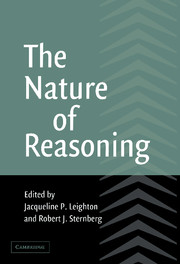Book contents
5 - Task Understanding
Published online by Cambridge University Press: 05 July 2011
Summary
How should experimenters interpret participants' solutions of reasoning tasks, in particular, solutions that appear to diverge from normative models? This question has produced a vast theoretical debate (e.g., Stein, 1996; Stich, 1990), a large part of which concerns the issue that will be addressed in the present chapter: How do participants interpret reasoning tasks? The fact that participants may interpret and represent the premises or the instructions of an experimental problem in a way that differs from the experimenter's interpretation has been recognized for some time (e.g., Henle, 1962; Orne, 1962). In the last couple of decades, several studies have been designed to investigate how verbal comprehension factors may affect inferential processes. The emergence of linguistic-pragmatics, including its recent experimental developments, has made researchers aware of the role of these factors in inferential processes (see Noveck & Sperber, 2002). The reasoning literature, however, has produced evidence that comprehension and representation mechanisms other than pragmatic factors determine performance in reasoning problems.
A necessarily reduced selection of this literature will be presented in this chapter, whose structure follows the conventional distinction between deductive and probabilistic reasoning. The chapter begins with a review of some of the evidence that shows how linguistic-pragmatic factors determine simple deductive inferences, and preempt domain-specific reasoning processes in the most famous problem in the psychology of reasoning. It then compares pragmatic anomalies and representational difficulties as potential sources of erroneous relational and probabilistic inferences. Finally, it considers some implications of these results for evolutionary theories of reasoning.
Information
- Type
- Chapter
- Information
- The Nature of Reasoning , pp. 103 - 126Publisher: Cambridge University PressPrint publication year: 2003
Accessibility standard: Unknown
Why this information is here
This section outlines the accessibility features of this content - including support for screen readers, full keyboard navigation and high-contrast display options. This may not be relevant for you.Accessibility Information
- 1
- Cited by
